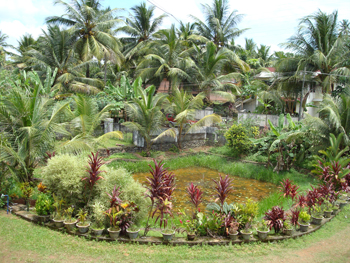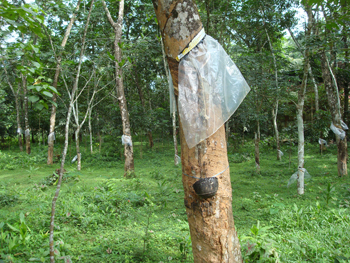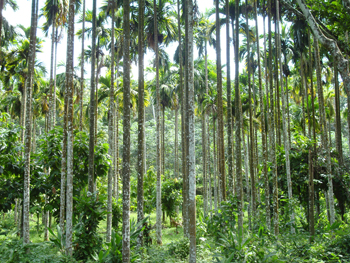The God of My "Nadhe"
By Debie Thomas
Nadhe. It was a sacred word in my immigrant family when I was growing up. A nostalgic, yearning word. Though it has no straightforward equivalent in English, I continue to search for a translation. Land. Earth. Countryside. Birthplace. None of these will do.
If I close my eyes, though, the Malayalam word blooms in precise, Technicolor memory: impossibly green rice paddies. Coconuts so tender that my grandmother scooped out their insides like whipped cream. The heavy, too-sweet scent of jackfruit, rotting in the sun. The cool, mossy darkness of the family well — forbidden to curious children.
 |
Kerala, India. |
"Nadhe," my relatives would say at family gatherings, hungry for something our suburban American lives couldn't satisfy. "Nadhe."
When my parents emigrated from South India in the early seventies, part of what they left behind was a way of life — and a way of faith — rooted in the earth. Both of my grandfathers were farmers as well as preachers. Sowers of the Word as well as sowers of, oh, just about everything: peppers, mangoes, bananas, coffee. Cashews, jackfruit, cassava, cardamom.
During childhood visits to Kerala (India's southernmost state), I'd follow my grandparents around as they worked, their chores an endless source of fascination. I'd stroke the soft-eyed cows and chase the roosters. I'd watch in wonder when my paternal grandfather collected "milk" from his rubber trees, and hold my breath when a farm hand shimmied up a scary-high palm tree to fetch a coconut. I'd run away when my grandmother killed a chicken for dinner, but run to "help" when a goat or a cow gave birth.
In the sweaty, soil-stained busyness of their days, I doubt my grandfathers stopped to philosophize much about their dual vocations. They simply preached and sowed, prayed and harvested — stewarding creation with one hand as they fed God's flock with the other.
 |
Kerala, India. |
Things changed drastically, of course, when my parents moved to America. Though they cultivated a garden behind every house we lived in, and though we visited India as often as we could afford, something vital — something old, deep, and sustaining — eluded us. I had no words for the loss when I was little, but I felt the shadow it cast over us. Hence the yearning. Hence the nostalgia. Hence, "nadhe."
Like many adult children of immigrants, I circle around and around the missing something, trying to pin it down. It's more than dislocation, more than homesickness. More than the trauma of leaving a mother tongue behind. It's tied to the earth itself, to an untethering from land, trees, soil, sky.
For my grandparents, "nadhe" was nothing romantic at all; it was simply the ground beneath their feet. The land of their ancestors, the soil in their fingernails, the fixed geography of a permanent belonging. When they sang worship songs about eternity, the word they used for heaven was the very same word they used to describe the coconut groves behind their houses. Nadhe. Not metaphor, not pie-in-the-sky, not abstraction. A real and solid place. God's country.
Like much of the rapidly modernizing world, South India is no longer the place it was when I spent childhood summers there. Many of the old farming families have sold their ancestral properties and gone abroad. Dozens of old houses stand dilapidated and empty. If my children ever go back when they're adults, they'll visit as tourists, unaware that the banana trees, rice fields, and bamboo forests outside their hotel windows once belonged to their great-great-great grandparents.
 |
Kerala, India. |
I sometimes hear Christians speak of our earthly life — and even the earth itself — as a waystation. "We are pilgrims and sojourners," they'll say. "This world is not our home."
I don't know. Isn't the earth given to us precisely to teach us what "home" is? What my parents lost when they left India was not a few acres of land. They lost their daily proximity to a nourishing earth. They lost a kind of rootedness. By way of contrast: perhaps it's because my grandparents were so deeply rooted to their earthly "nadhe" that they were able to grasp their heavenly one so easily.
I'm not a born green thumb, despite my heritage. But I love forests, mountains, deserts, and beaches. I love the sky at night, and the clouds before a storm. I can stand forever in front of a waterfall.
If it weren't for my childhood memories of India, I might not know to associate these loves with God. But he is in them. He is everywhere in creation — a creation he called "good" and "very good" at its inception. These days, when I tend a potted plant, or hike a forest trail, or admire a thousand-year-old redwood tree, I try to remember that I'm on holy ground, glimpsing another face of God. The God of my nadhe.
Image credits: (1–3) Debie Thomas.



